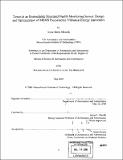Towards and embeddable structural health monitoring sensor : design and optimization of MEMS piezoelectric vibration energy harvesters
Author(s)
Mracek, Anna Marie
DownloadFull printable version (18.47Mb)
Alternative title
Towards an embeddable composite health monitoring sensor : design and optimization of MEMS piezoelectric vibration energy harvesters
Other Contributors
Massachusetts Institute of Technology. Dept. of Aeronautics and Astronautics.
Advisor
Brian L. Wardle.
Terms of use
Metadata
Show full item recordAbstract
Wireless structural health monitoring (SHM) has gained considerable interest as a potential method of reducing aircraft maintenance costs while increasing safety. Distributed power supplies for the sensing nodes are needed for a practical implementation of this technique. Vibrational energy harvesting using MEMS piezoelectric resonant devices is an appealing solution to this challenge due to their relatively high potential for power generation (compared to other harvesting techniques) and capacity to be integrated into the microfabrication procedure of the remainder of the SHM node. A comprehensive review of energy harvesting devices, particularly piezoelectric harvesters, is presented, including characterization of previous devices in terms of key power performance metrics. An existing coupled electromechanical model is presented and modified for use in optimization studies with both {3-1} Mode and {3-3} Mode piezoelectric cantilevered beam configurations. The modified model accurately represents published experimental results. A series of design optimization studies is presented for four devices operating in an aircraft vibration environment. (cont.) Untapered bimorph {3-1} Mode and unimorph {3-3} Mode MEMS devices with large proof masses, as well as tapered unimorph devices (both with and without proof masses) are studied and a 2- or 3-parameter geometric optimization is performed. Optimization objectives include power output, operating power density, static power density, and specific power with very different optimum device configurations favored for the different objectives. A {3-3} Mode MEMS unimorph device optimized for static power density is conservatively predicted to generate 1.9 mW/cm3 of electrical power. This optimization is presented graphically and the predicted performance of the optimum {3-3} Mode unimorph devices with proof masses is detailed. It is found that the optima occur within the micro-scale design space studied, suggesting that MEMS devices are the best choice for distributed aircraft vibrational energy harvesting. The optimization results presented are for one potential SHM vibration environment using cantilevered beam harvesters, however, the technique presented can be extended to other environments and other harvester geometries.
Description
Thesis (S.M.)--Massachusetts Institute of Technology, Dept. of Aeronautics and Astronautics, 2006. Includes bibliographical references (p. 123-127).
Date issued
2006Department
Massachusetts Institute of Technology. Department of Aeronautics and AstronauticsPublisher
Massachusetts Institute of Technology
Keywords
Aeronautics and Astronautics.